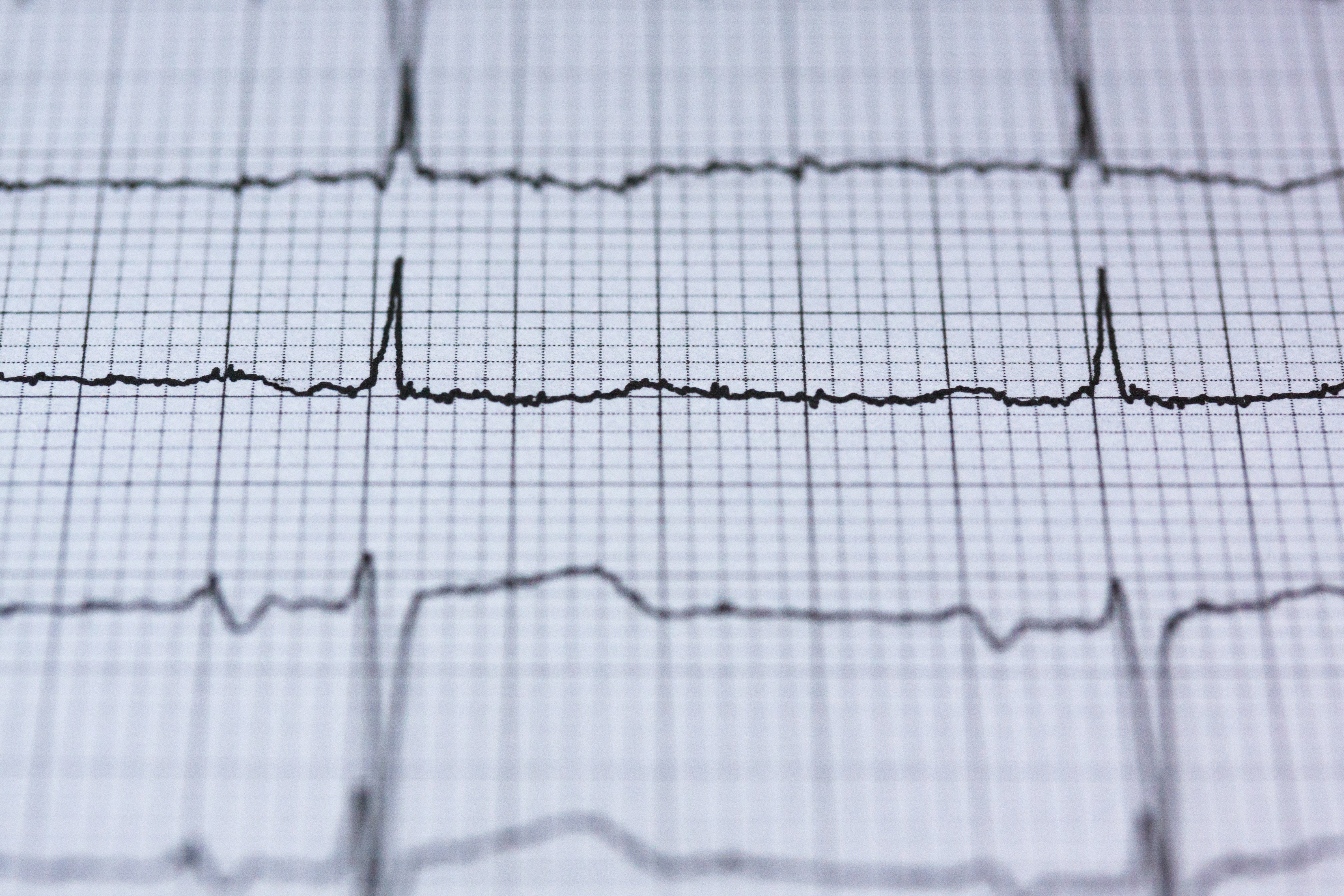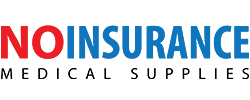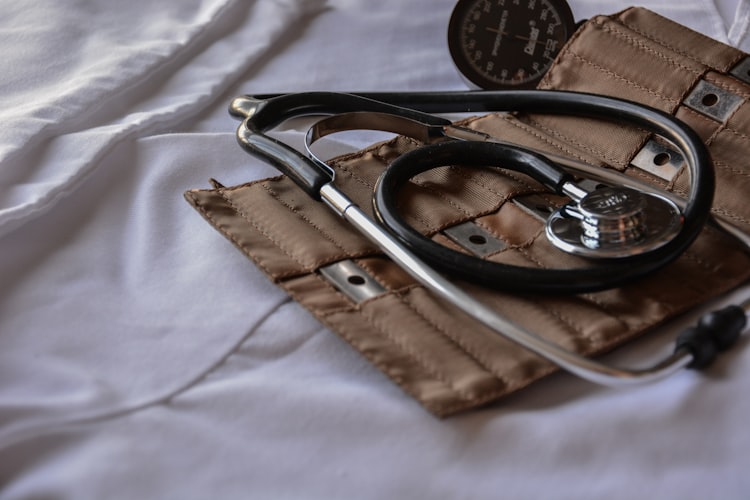Recently, WebMD published an article stating that obstructive sleep apnea “doubles [the] risk of death due to heart disease” for nearly 30 million adults in the United States. This common — and commonly overlooked — sleep disorder, in which breathing passages are temporarily blocked off when the upper airway collapses, can negatively impact heart health in several ways.
How serious can sleep apnea be in terms of heart health? Just consider the acronym HEARTS that WebMD used to highlight the most common diseases that are likely to result from untreated sleep apnea.
Heart Failure
Elevated blood pressure
Atrial fibrillation
Resistant hypertension
Type 2 diabetes
Stroke
To say that such medical conditions are a serious concern is a bit of an understatement. Here’s a closer look at what these health issues entail, and how they relate to sleep apnea.
Warning Signs of Sleep Apnea

Understanding your risk for HEARTS starts by being able to recognize if you have obstructive sleep apnea. Though sleep apnea requires a medical diagnosis to be officially confirmed, there are key warning signs you and your partner should look out for that indicate you should consult a sleep specialist.
The most commonly cited sign of sleep apnea is loud snoring, as well as gasping or choking during sleep. The sleeper usually doesn’t wake up as a result of these incidents, which in severe cases, can occur upwards of 30 times in a single hour. Instead, their bed partner will be the one to notice — making good communication in the relationship absolutely essential.
If your bed partner is a sound sleeper or if you are single, there are other warning signs that may indicate that you have developed sleep apnea. Individuals who suffer from sleep apnea are more likely to experience headaches, sore throat, and dry mouth when they wake up in the morning.
Because of their disrupted sleep, individuals who suffer from obstructive sleep apnea will also be more likely to suffer from excessive sleepiness during the day. This can get so extreme that you might fall asleep while at work, while watching TV at home, or even while driving. This fatigue can also contribute to trouble concentrating and irritability, resulting in additional trouble at work or at home.
While mild snoring isn’t necessarily a cause for alarm in and of itself, a combination of these symptoms should be investigated with the help of a sleep specialist, especially if you have any of the common risk factors for sleep apnea, such as wide neck circumference, obesity, or being male.
Heart Failure

Heart failure is a general term used to describe a situation where the heart can’t pump enough blood. This could happen when the pumping action grows too weak to get oxygen-rich blood throughout the body. Or it could occur when the heart doesn’t fill properly with blood.
Regardless of the exact nature of heart failure, its consequences can be quite dire — especially since there is no true “cure” for heart failure. Shortness of breath and fatigue are commonly experienced by those with heart failure, even during relatively mild activities. Over time, this can get so extreme that something as simple as getting dressed could cause you to feel out of breath. Fluid buildup may also occur in the legs, feet, liver, and other areas.
Other consequences of heart failure include a cough that is worse at night and excessive weight gain. Fluid buildup in the lungs could require emergency medical care. In the long run, heart failure could severely limit your ability to participate in activities that require physical exertion.
While there is no cure for heart failure, it can be managed by treating the underlying conditions contributing to the disease. CPAP treatment can control sleep apnea, but depending on the progression of heart disease, you may need to take medications and make other lifestyle changes.
Elevated Blood Pressure
The area where sleep apnea has the most immediate and direct impact is your blood pressure.
As the Sleep Foundation explains, “When you stop breathing while you sleep, your heart rate drops, and then your involuntary reflexes make you startle into a micro-arousal, which causes your heart rate to accelerate quickly and makes your blood pressure to rise. In addition, sleep apnea can lead to repeated episodes of lower oxygen levels in the blood, increases in carbon dioxide levels, pressure changes in the chest, and increased inflammation markers in the body, all of which can wreak havoc on heart function.”
High blood pressure puts too much pressure against the walls of your arteries, and is a leading contributor to more serious health conditions, including heart failure, stroke, and heart attack. Many people have asymptomatic hypertension, and as a result, their high blood pressure is only detected when they visit the doctor.
When high blood pressure is the result of obstructive sleep apnea, blood pressure tends to be higher than in someone who gradually developed the condition over several years. To stave off more severe health consequences, your doctor will likely recommend losing weight, increased exercise, and changes to your diet. CPAP therapy is also a must if sleep apnea contributes to your high blood pressure.
Atrial Fibrillation

An irregular heartbeat is another common consequence of obstructive sleep apnea, particularly in the form of atrial fibrillation. In this condition, the heart’s upper chambers quiver rather than pump with a normal, healthy rhythm.
Some people who suffer from atrial fibrillation may experience nausea and light-headedness. Others don’t notice any symptoms until a routine visit with their doctor. Despite this, atrial fibrillation can be extremely serious.
According to the American Heart Association, between 15 and 20 percent of all stroke victims had atrial fibrillation. The irregular heartbeat makes it easier fro clots to get trapped in the arteries. Left untreated, this condition doubles the risk of death caused by heart problems.
Resistant Hypertension

The high blood pressure that results from frequent interruptions to sleep is often referred to as secondary hypertension because it is the result of an underlying condition. Quite often, this sleep apnea-derived form of hypertension will escalate into what is known as resistant hypertension.
In resistant hypertension, normal treatments and medications prove to be less effective in helping the body maintain healthy blood pressure levels. Although studies estimate that only 10 percent of all people with hypertension develop resistant hypertension, the risk is greater among those with sleep apnea.
Resistant hypertension is typically diagnosed if a patient’s blood pressure remains above 140/90 mmHG after six months, even with the use of three targeted medications. Sleep apnea’s contributions to nightly blood pressure spikes can cause hypertension to be “resistant” to treatment, even if a patient is following all other health guidelines.
Left unchecked, resistant hypertension greatly increases the risk for heart failure, stroke, and even renal failure.
Type 2 Diabetes

Type 2 diabetes and sleep apnea share a complex relationship, particularly in regards to obesity. Being overweight or obese increases one’s risk of developing obstructive sleep apnea. At the same time, the presence of obstructive sleep apnea has the potential for contributing to weight gain. The result can be a vicious cycle in which the two conditions play off each other.
As noted by the American Diabetes Association, however, sleep apnea can directly affect the likelihood of developing type 2 diabetes: “Obstructive sleep apnea (OSA) alters glucose metabolism, promotes insulin resistance, and is associated with development of type 2 diabetes.”
Sleep apnea not only increases the risk for type 2 diabetes, but it also increases its severity. In addition to increasing the risk for stroke and heart disease, type 2 diabetes is often associated with nerve damage resulting from excess sugar. What starts as numbness or pain in the toes or fingers can spread through the limbs, greatly limiting normal daily functions.
In extreme cases, limbs may need to be amputated as a result of type 2 diabetes. Type 2 diabetes has also been linked to Alzheimer’s disease, kidney damage, vision problems, and more.
Stroke

While sleep apnea isn’t going to directly cause a stroke, it greatly increases your risk for this medical emergency by directly contributing to underlying factors that can cause a stroke. A stroke occurs whenever the blood supply to the brain is interrupted. Though this most often results from blocked arteries, a burst blood vessel could also cause a stroke.
Without rapid treatment, you could die or experience lasting disabilities due to the lack of blood and oxygen going to the brain. Stroke causes 140,000 deaths each year in the United States, while also being the leading contributor to significant long-term disabilities.
A look at the common risk factors for a stroke reveals how sleep apnea increases the likelihood of this event. High blood pressure is considered to be the greatest risk factor for a stroke, while atrial fibrillation, diabetes and other heart diseases can also be contributing factors. Because all of these conditions can stem from sleep apnea, those who fail to address their sleep apnea may also be increasing their risk for a stroke.
CPAP: The Key to Better Sleep — and Better Heart Health

While untreated sleep apnea can have significant health consequences, undergoing CPAP treatment can make a huge difference in improving sleep quality and helping you avoid the deadly consequences of HEARTS.
By providing a steady flow of air throughout the night, the use of a CPAP machine ensures that your breathing passages will stay open at all times. You won’t experience the interruptions to sleep that increase the body’s stress levels and cause blood pressure to spike. As a result, you become less likely to develop any of the serious conditions falling under the acronym HEARTS.
Just how effective can CPAP treatment be? As highlighted by WebMD, recent studies have found that “Use of the continuous positive airway pressure (CPAP) mask was tied to a 62 percent decline in the odds for death over 11 years of follow-up,” even when factoring for other risk factors.
By improving your health and helping you avoid the conditions included in HEARTS, you will also be able to dramatically lower medical expenses over time. You won’t have to undergo invasive treatments, take expensive medications, or be in and out of the doctor’s office all the time. On a day to day level, you will have more energy and enjoy improved mood and concentration. You will have the time and health to enjoy your normal life.
While getting used to wearing a CPAP mask at night can take some time, remaining compliant with your prescribed treatment plan is well worth the effort. By improving sleep quality and lowering your risk for serious medical problems, you will feel better than ever.
Parting Thoughts
Snoring or feeling fatigued in the morning because of your obstructive sleep apnea may not seem like a big deal at first. But over time, the continued interruptions to sleep pose a serious risk to your overall well-being — and your life. Remember the acronym HEARTS, and you should have plenty of motivation to use CPAP therapy to get a better night’s sleep.
Of course, purchasing the CPAP equipment you need for your treatment isn’t always easy. CPAP machines and accessories can cost a lot of money, especially if you don’t have health insurance to help cover these expenses.
That is why at No Insurance Medical Supplies, we offer quality CPAP equipment at a price you can afford. Whether you’re purchasing brand new equipment at a discounted price, combining multiple items into a bundle pack, or even purchasing refurbished/certified pre-owned equipment, we offer plenty of ways to save on top brands like ResMed and Philips Respironics. Better still, free shipping on orders over $89 and available financing on select purchases further improves affordability, helping you make less expensive monthly payments for your equipment.
Your heart health matters — and you don’t want HEARTS to spoil your future. By purchasing your CPAP equipment through No Insurance Medical Supplies, you can take control of your sleep apnea so you can enjoy a well-rested and heart-healthy future.

